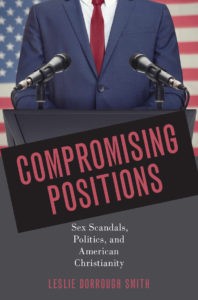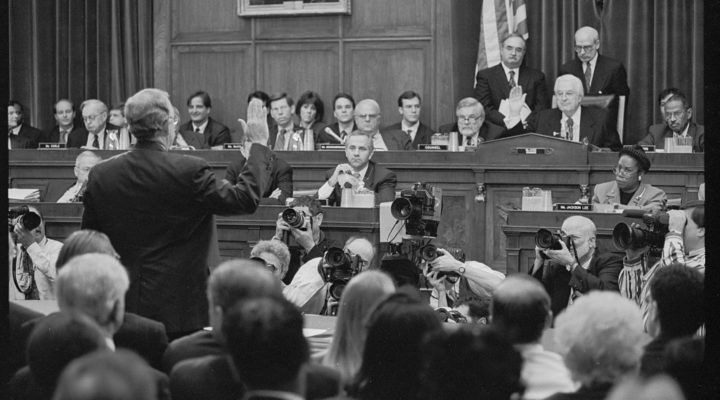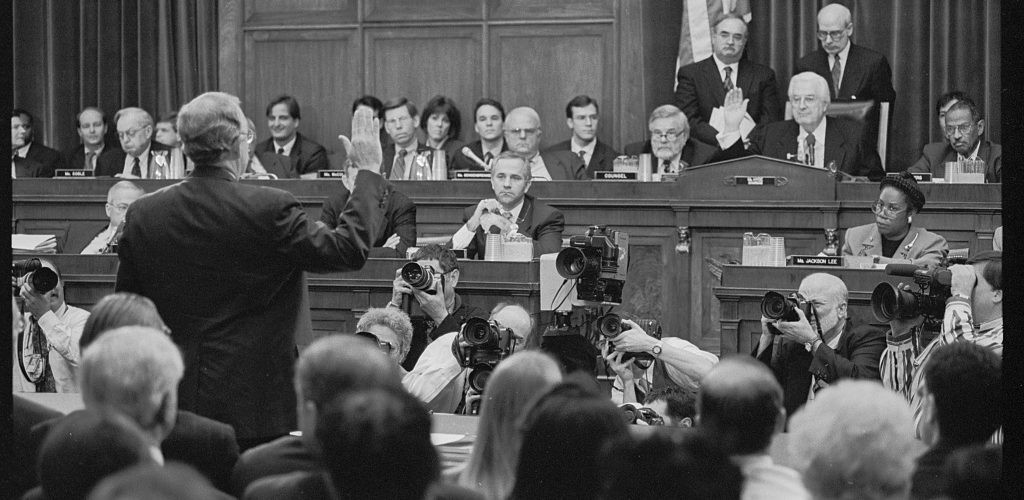Sex scandals are nothing new to American politics and yet have an uncanny ability to rouse the American public. Religious studies scholar Leslie Dorrough Smith’s recent work, Compromising Positions: Sex Scandals, Politics, and American Christianity, argues that this phenomenon is wrapped up in the nation’s “national fantasies” about power, strength and masculinity.
 Smith’s work analyzes a number of “sex scandals” from the past four decades — from the infamous Bill Clinton and Monica Lewinsky affair to the more recent scandal that played out in front of the Senate Judiciary Committee between then Supreme Court nominee Brett Kavanaugh and his accuser, Christine Blasey Ford.
Smith’s work analyzes a number of “sex scandals” from the past four decades — from the infamous Bill Clinton and Monica Lewinsky affair to the more recent scandal that played out in front of the Senate Judiciary Committee between then Supreme Court nominee Brett Kavanaugh and his accuser, Christine Blasey Ford.
Her work has been cited recently as the nation watched the release of a scandalous photo that has — at least for now — toppled Jerry Falwell Jr., president of Liberty University.
Through her analysis of these scandals, Smith attempts to uncover why some politicians in the face of quite damning evidence emerge unscathed while other politicians are condemned for comparatively less egregious accusations. The answer, she says, lies within the conflicting stories American Christianity has created about masculine sexuality.
On the one hand, Smith contends, American Christianity has perpetuated the narrative that men are leaders. From theological developments like “muscular Christianity” to John Eldrege’s Wild at Heart: Discovering the Secret of a Man’s Soul, Christian leaders have labeled men as rugged and sexual creatures at heart. These masculine and virile characters are viewed as fundamentally good, God-given qualities that make men more adapt to lead and protect loved ones.
On the other hand, American Christianity has suggested that men are sexually weak-willed and prone to distraction. Women, therefore, must dress appropriately and act in ways that do not lead men astray. In this narrative, men’s sexuality is a character flaw that must be surveilled and kept in check.
Sex scandals rhetorically dance between the ideals held within these two conflicting stories.

Supreme Court nominee Brett Kavanaugh gives his opening statement at the Senate Judiciary Committee hearing, Sept. 27, 2018. (Michael Reynolds/Pool Image via AP)
“The way Americans respond to sex scandals is much more about their desire to maintain certain ideals about the nation-state than it is to serve any sort of consistent ethical function,” Smith wrote.
And on the political stage, while it is easy to point out the hypocrisy of both Republicans and Democrats, sex scandals are fundamentally not about sexual ethics or beliefs about morality, she explained. Sex scandals are about how we understand our national identity through our political leaders. Are they strong? Will they effectively lead the country and protect its citizens?
The rhetoric of sex scandals is particularly important as it allows politicians the opportunity to project white, hypermasculine, heterosexuality that has wide-standing appeal among evangelical voters in particular. The politicians seek to frame themselves as a type of father figure. “The public,” Smith wrote, “places considerable trust in these father figures.”
If a scandal-dogged male politician is able to frame himself in such a light, then the country, acting almost as an imagined family, may rally behind him enough to save his political career.
Smith spoke with Baptist News Global on her research and the current landscape of sex scandals in America.
Q. What compelled you to begin researching sex scandals?
Part of the political rhetoric occurring today involves each side describing the other as hopelessly contradictory and morally bankrupt. I find ethical contradictions really interesting, academically speaking, because everyone is contradictory at some point in time, and most of us quite frequently. However, we often try to “trap” our opponents with claims that they’re the ones with the contradiction problem. Moreover, we often defend our contradictions if we’re aware of them, and I wanted to know more about what that process looks like, rhetorically speaking.
I use a lot of rhetorical methods in my work, which is basically studying how people communicate about a topic and what kind of messages they send each other. Rhetorical methods are helpful because rather than declaring that one group is right and another is wrong, you can discover very subtle but powerful social ideas that are present in the way people communicate.
“Sex scandals, it turns out, because they are very public types of conversations, are filled to the brim with all sorts of subtle messaging about race, gender, sex, class, religion.”
Sex scandals, it turns out, because they are very public types of conversations, are filled to the brim with all sorts of subtle messaging about race, gender, sex, class, religion.
So that is the more academic reason I chose this topic. In a very practical sense, though, most Americans have very strong feelings about adultery, sex and gender. And as a scholar who studies conservative Christian ideas about sex and gender (not to mention race and class), sex scandals seemed like a prime target to examine because the contradictions regarding what we will or won’t tolerate as a public seem like they should be so clear, and yet they aren’t.
Q. In your book, Compromising Positions, you note how sex scandals are no respecter of political affiliation and affect Republicans to Democrats alike. Could you elaborate a little on how the two groups differ in their response to sex scandals and perhaps also how the two are similar?
The short answer is that while male politicians from both sides of the aisle engage in illicit sex, there are some management techniques on how to deal with a sex scandal that often appeal more to, and are thus more successful with, conservative audiences.
The long answer, though, is that any politician can engage in any of these techniques. Here’s what I mean: As you’ve mentioned, male politicians (who are caught in sex scandals far, far more often than their female counterparts) are perceived in one of two general ways by the public when news of their sex scandal erupts.
First, those who come off as strong, aggressive masculine leaders, so long as they are white and straight, are often understood more positively as “manly men,” for lack of a better term. Because the sexuality of white straight men is often not perceived as threatening, but normal — think of the “boys will be boys” motif — leaders who come off this way are often more likely to get their sexual indiscretions excused or downplayed by the public because they serve the important symbolic role of national protectors. We’re willing to overlook the adultery in exchange for the feelings of national superiority and protection, in other words.

Former Mayor Rudy Giuliani speaks to supporters at an immigration policy event hosted by Donald Trump in Phoenix. (Photo by Gage Skidmore, Creative Commons License)
Rudy Giuliani is a great example of this, because even though he is a Republican, he was a very centrist one governing otherwise liberal New York City. After 9/11, no one cared about his rather sordid affairs, because they simply saw him as the guy who came to the rescue once 9/11 happened. His extremely long (and often very public) history of adultery was virtually erased.
On the other hand, those who come off as weak and effeminate, or who are non-white or gay, generally cannot lean on the positive associations between these identities and their sexuality. This is also the case for politicians whose major platforms deal more with helping the poor or another type of cause that doesn’t really invoke a chest-thumping masculinity.
John Edwards, a Democrat, is a good example here, because Edwards spent most of his time in political office advocating for more disadvantaged Americans. He did not have the same sort of national “enemy” at his symbolic disposal like Giuliani did, which tends to be more popular with conservative audiences. On top of that, the fact that Edwards was considered traditionally good-looking meant that the media (and others) talked about his appearance all the time, years before there was ever an inkling of a sex scandal. This would later become ammunition against him by his political detractors, who would call him names like “pretty boy” and other emasculating terms.

John Edwards campaigns in Pittsburgh in 2007. (Photo by Mike Murphy, Creative Commons License)
Ultimately, once his scandal broke, Edwards was portrayed as a selfish and vain man who turned his back on his sick wife (Elizabeth Edwards, who died of cancer not long after the affair was public). There was nothing noble to salvage of his reputation because he had no positive masculine symbols to attach to the situation.
My argument is that we vacillate between these choices because they make us, as Americans, feel a combination of protection and moral superiority. Those whose indiscretions we overlook, like Giuliani, often make us feel safe, while those we decide to crucify (metaphorically speaking), like Edwards, make us feel like we have strong moral standards, and they’re the ones on whom we’ll display them. It’s easier to overlook your own contradictions so long as you feel, overall, like you’re doing the right thing, and this can be true of the American public just as much as it can any one individual.
While this back and forth can happen with leaders of any political affiliation, it is simultaneously true that the idea of a lurking public enemy has often taken on more dramatic and frequent forms in conservative speech. However, that idea has utility across all political groups, so it could be deployed by a Democrat if the political conditions were right.
Q. In an article with Religion Dispatches about Jerry Falwell Jr’s recent scandal, you mention that Falwell is not seen as enough of a national figure for the public to view his masculine “tough guy” persona as part of their national story, whereas someone like Donald Trump clearly is a national icon for many. Are there any religious figures who fit or have fit this national icon status? How does this national status factor in to whether or not someone overcomes or succumbs to the scandal?
My research was focused entirely on politicians, and there’s a reason for that: politicians, in my estimation, get a pass in a way that religious leaders may not. Why? The reason is because politicians have something to exchange for their bad behavior: a feeling of national power, superiority, protection. Religious leaders are often expected to be moral perfectionists (often to a degree that is humanly impossible), and while being seen as a moral model is a very powerful position, they have little else, symbolically, with which to barter. So when they fall, they often fall hard.

Screencap of Jimmy Swaggart’s “I have sinned” sermon.
I mention in the book that Jimmy Swaggart and Jim Bakker were instrumental in creating a type of environment in the 1980s where it became hard for the public to ignore sex scandals. Their respective scandals were so visible and sensational that they really set certain expectations within investigative journalism — namely, that Americans deserve to know about the private lives of public figures. In a lot of ways, they prefigure the media coverage of sex scandals today.
There is an important difference to point out between religious leaders and politicians, however. Generally speaking, with politicians, apologizing too much for a sex scandal is a one-way ticket to losing your job, because apologies are often seen as a type of weakness (and this is a sentiment felt even among folks who say that apologies, for wayward politicians, are the “right thing to do”). Most of the politicians I cover in the book who survive their sex scandal with their reputations generally intact do not apologize in any sort of contrite, public way (Bill Clinton is a noteworthy exception).

Jim Bakker during a PTL show broadcast, 1986. (Photo by Peter K. Levy, public domain)
But almost all preachers/religious figures who I’ve seen do end up apologizing, sometimes quite dramatically (for instance, there is Swaggart, whose screaming, tear-filled apology was one for the history books), because that is the only path forward in religious groups.
For the general public expecting a political leader to govern and protect, the path out of the scandal will involve displays of masculine leadership and the behaviors associated with it. That’s why apologies aren’t so important in this setting, and may even be detrimental.
Q. The New York Times recently revisited the scandal that resulted in Democratic House member Katie Hill’s resignation when her polyamorous relationship with a campaign staff member came to light. Much of your research focuses on men. How do you think a woman accused of a sex scandal changes the equation, or does it?
I write in the book that I focused on male politicians in part because there are not enough female politicians who’ve been caught in a sex scandal to provide any sort of reliable data set. It is also the case, though, that virtually every time there has been such a case, the female politician in question resigns quickly, such as was the case with Katie Hill.
Hill’s political liabilities were compounded by the fact that her sex scandal involved another woman, and at first some said that the other woman was her subordinate, so an ethics violation might have occurred. If you look at the number of politicians who have been charged with ethics violations and still kept their office, the list is very long. So that factor should not have doomed her automatically, if we were dealing with a level playing field.

Former U.S. Congresswoman Katie Hill speaks with attendees at the 2019 California Democratic Party State Convention. (Photo by Gage Skidmore, Creative Commons License)
But we’re not, and it’s important to consider why. The short answer is that Hill, as an openly bisexual woman, had little to offer the public that could cast her as a strong protective leader, symbolically speaking, once her sexuality was in full view (in her case, a photograph was leaked).
Part of this is a matter of women and sexuality: the more conservative gender ideals that pervade American culture associate sexuality much more with men than women. But most centrally, Hill, as a woman, was already in a losing situation since the public doesn’t associate “female” with strength, protection or leadership. This is why female political candidates outside of any scandalous context often have a much harder uphill climb to win election.
So the reason for the double standard is that women do not enter into these very volatile settings with positive symbols on their side.
We can get a glimpse of these negative symbols at work when we examine how certain women who alleged sexual harassment against powerful male politicians were treated by the public. A chapter of the book is devoted to Anita Hill and Paula Jones (in light of their allegations against Clarence Thomas and Bill Clinton, respectively).
To be very clear: these women were victims who were not, themselves, politicians. And they were treated terribly. They were accused of all sorts of lying and deception, and each had intricate sexual stories concocted about her to explain away her allegations. Race also played a factor in the ways these women were socially construed as inappropriately sexual. Hill was portrayed according to the stereotype of the hypersexual Black woman by a writer who would later admit that he had waged a smear campaign against her. Jones was openly depicted as “poor white trash” by those who once supported her once news broke that an old boyfriend had nude pictures of her and was willing to sell them.

Anita Hill testifies before the Senate Judiciary Committee during Clarence Thomas’ Supreme Court confirmation hearing. (Photo by R. Michael Jenkins, public domain)
So, to reiterate: as a culture, we generated this degree of negativity about largely fictitious stories of women who were actually sexually victimized by someone else. In light of that, is it really any surprise that when a female politician is consensually sexual in ways that disrupt cultural expectations, that there is no public way to understand her behavior other than to make her go away?
Q. How do you think that your research on national sex scandals could translate to local religious communities when a pastor or spiritual leader is accused of sexual wrongdoing? Instead of being viewed through a story of national identity, might there be a chance it could be viewed through a congregational or communal identity?
This strikes me as a question people might want to read in more therapeutic or pastoral ways, and since I don’t have expertise in either one of those areas, I don’t have any advice to offer from that perspective. My training is more in the sociology of religion, and so some ideas from Emile Durkheim, who was the founder of the discipline of sociology, may nevertheless provide some commentary.
Durkheim was interested in how religion works, and so he wanted to understand more about how people put it to use. He understood religion as a fundamental social force because it got people to stop thinking about themselves individually, he thought, and to start thinking about the group. To him, when groups made religious appeals or talked about what “God” wanted, the observant scholar shouldn’t try to figure out whether the group is right or wrong, because those are matters of faith. They’re not particularly scientific statements, in other words, which was his concern.
But that didn’t mean he couldn’t find predictable patterns in the ways social groups used religious ideas. He discovered that when groups make appeals to “God,” they are really talking about what they, socially and communally, think they need to maintain their current structure and form as a collective. If we want to put that into a mathematical equation, we could say God = society in the sense that when a group says, “God wants this,” what it really means, sociologically, is, “We, the society, want this.”
So there’s quite a lot that Durkheim might say about any given type of collective or community and the way they use God-related rhetoric to talk about their moral standards.
In a nutshell, what the community thinks it needs or wants very much determines how it will use religious rhetoric. This is particularly the case when a rule violation occurs, because then the group’s identity feels like it’s on the line. Those moments of vulnerability are important to study because they expose the workings of society that we might not otherwise see.
 Andrew Gardner holds a Ph.D. in American religious history and is the author of Reimagining Zion: A History of the Alliance of Baptists.
Andrew Gardner holds a Ph.D. in American religious history and is the author of Reimagining Zion: A History of the Alliance of Baptists.


